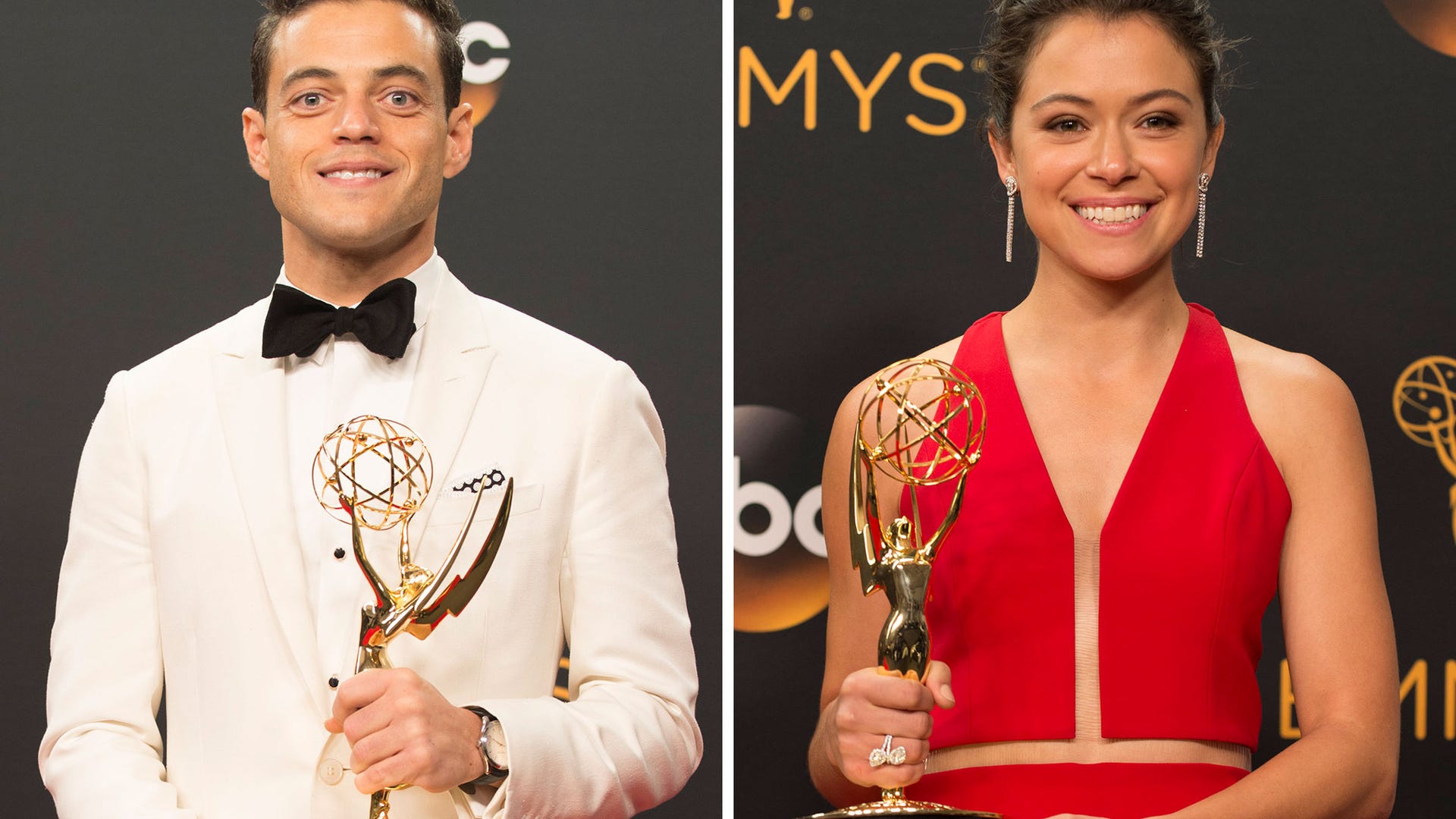Join or Sign In
Sign in to customize your TV listings
By joining TV Guide, you agree to our Terms of Use and acknowledge the data practices in our Privacy Policy.
With Tatiana Maslany and Rami Malek, the Emmys Finally Got It Right
Orphan is the new black
The Academy that bestows the Emmy Awards, television's biggest honor, aren't the most progressive awarding body around. Like the Oscars and Grammys, the Emmys have struggled to keep up with a frankly ludicrous influx of talent and product mixed with a rapidly changing entertainment landscape -- and haven't always succeeded (to put it lightly). But last night (Sept. 18), by awarding two of the night's top honors to actors Tatiana Maslany and Rami Malek, the Emmys finally got it right.
Not that they got it wrong before, per say. Not exactly. The acting categories for Best Drama have always been stuffed with talent, and last year's winners Jon Hamm (for Mad Men) and Viola Davis (for How to Get Away With Murder) have created classic television characters we'll be watching in Emmys compilation reels for decades to come.
But most of the time, the winners haven't felt progressive. Hamm, and the previous year's Lead Drama Actor winner Bryan Cranston (for Breaking Bad) were belatedly rewarded for their work on the final seasons of shows that critics and fans knew were classics for years. Both were nominated the two years before their wins (three for Hamm), only to be beaten by Jeff Daniels for The Newsroom in 2014, and Damian Lewis for Homeland in 2013. Great actors, good shows, but when the dust clears in a decade, we'll still be talking about Mad Men and Breaking Bad, while Newsroom: The Next Generation will have just gotten around to covering that Emmys cycle.
(To be fair, Cranston had already won for Breaking Bad three times so perhaps it's better to categorize his wins as part of the problem.)
On the Lead Actress side, the cracks in the establishment started last year with Davis' win. Her performance as volatile lawyer Annalise Keating is extraordinary, and elevates HTGAWM from a twisty procedural to something else entirely. Not to mention: it was the first time a woman of color had ever won the award, and a nice change from the rest of the 2010s, which rewarded (in reverse order) Julianna Margulies, Claire Danes, Claire Danes, and Julianna Margulies.
Though Maslany's win is also overdue -- she was nominated last year, and fans and critics knew how stunningly good she is on BBC America's clone drama Orphan Black for two years prior to that -- it continues the establishment shake-up Davis' win started last year. It's not that the rest of the actors in the category don't deserve awards (they do), it's that Maslany's performance as eight different clones, sometimes in the same scene, is nothing short of a miracle.

Malek's performance falls in the same category: fueled by enormous eyes that sometimes show terror, and always intelligence, Malek's portrayal of anarchist, broken hacker Elliot Alderson on Mr. Robot is stunning to watch. What's even more extraordinary is that he was rewarded for his work on the first season of USA's drama; unlike Hamm and Cranston, he didn't have to wait five years.
Check out our complete Emmy Awards coverage here
Credit the Television Academy's new voting system for making this happen. My colleague Joyce Eng goes into more detail here, but suffice to say that the new rules mean that it's possible to win the award even if every voting member hasn't seen your show. That's a huge benefit to shows like Orphan Black and Mr. Robot, which get a lot of critical coverage (deservedly), while also getting far fewer viewers than other nominated shows in their category.
More importantly, though, Maslany and Malek are young. Awards shows have a tendency to give out their statues as a consolation prize, rewarding decades of journeyman work for a project that may be significantly less deserving than the classic the actor is known for (the Oscars, to be fair, are far worse at this than the Emmys).
Maslany and Malek, though, are at the beginning of their sure to be very long careers. Giving an award to them encourages young creators to experiment with acting, writing and directing roles that on paper seem impossible to sell. (A clone conspiracy? A hacker with multiple personality disorder? Whither all the doctors and lawyers?)
Awards like these allow actors -- and networks -- to continue making bold choices on shows like Orphan Black and Mr. Robot that push TV forward. They're not procedurals (though those have their place), and they're not workplace dramas (though those have their place, too). They're something else entirely --something new, anchored by phenomenal performances by stupendously talented actors like Maslany and Malek.
To me, that's what I think of when I think of "award-winning." Let's keep that Emmys train moving forward in 2017.
Editor's Note: An earlier version of this story erroneously neglected to mention Bryan Cranston's prior Emmys wins. Please don't stuff us in a barrel of Hydrofluoric acid.
